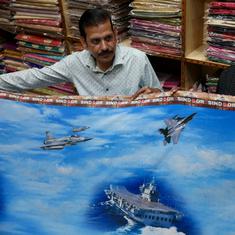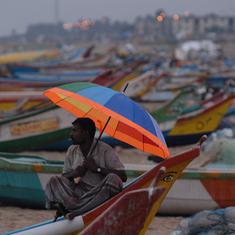The European guests unanimously denounced the USA and the “Kiev junta”, while praising Vladimir Putin and the Russian law against “gay propaganda”. A few antifasicists half-heartedly picketed outside the hotel. The forum ended ahead of schedule, when a bomb threat was called into the hotel.
“Are such people here on purpose? Are they trying to cause a conflict from the moment you enter?” asked a long-haired man with a bowtie as he checked his coat. Despite his elegant outward appearance, he was not there to see a play; he had come to attend the Russian conservative forum at the St. Petersburg Holiday Inn, where labour migrants from Central Asia were working at the cloakroom.
The convention of Russian nationalists, who now prefer to call themselves “conservatives” or “traditionalists”, was also attended by European fellow-thinkers. The tone of all subsequent speeches was set by the opening address of Yury Lyubomirsky, the forum organiser and coordinator of the St. Petersburg chapter of the political party Rodina (Motherland). “Our dream is the national liberation of Europe,” he proclaimed, using the term “national” to denote “ethno-national”, as is typical in the Russian language.
Fyodor Biryukov, member of the political council of Rodina, praised his own event. “This is the first stone laid in the foundation of the new world order we are destined to build. St. Petersburg is becoming the city of a new revolution – a revolution of national interest against the conspiracy of the world’s 100 wealthiest families, who have turned the planet into their own plantation,” he said. According to Biryukov’s plan, the “people of good will” who gathered at the forum must come together to form their own conservative international organisations to replace the “pro-fascist UN and OSCE”.
“Anyone who speaks with any member of the Ukrainian government is an accomplice of terrorists,” Biryukov raged on, rendering Vladimir Putin an accomplice as well, since the Russian president periodically shakes hands with Ukrainian president Petro Poroshenko.
Biryukov concluded his speech with an emotional outcry: “In the imperial city of St. Petersburg we witness the dawn of a new world of nations! To freedom! To the nation! To the Motherland!”
The next presenter was Roberto Fiore, head of the Italian party New Force. Fiore said that as a Roman, he knows that “Moscow is the third Rome, and the role of Russia in history is to revive Christianity.” He noted that these are not his own words, but rather “the words of God.”
During the break, the Italian politician explained why he and his European colleagues came to St. Petersburg and why they support Russia: “We don’t want war, we want normal trade to resume with Russia, and we need an alternative to American imperialism.”
Fiore turned towards a New York Times journalist and asked why there were hundreds of American military bases in Italy. The journalist responded by asking whether Fiore was concerned that Putin is using European far-right parties for his own ends. “No! Even [Italian prime minister] Matteo Renzi came to Moscow in March to improve relations with Putin. Even [German chancellor] Angela Merkel and [French president] Francois Hollande don’t want to quarrel with Russia. We just declare openly what they say in secret. No one in Europe, except maybe the Baltic states, wants sanctions against Russia, everyone wants to be Russia’s friend,” answered Fiore. According to him, the Americans are insisting upon sanctions, even though their trade turnover with Russia increased by 20% last year, while Europe’s decreased by the same amount.
Avoiding radical statements
Representatives of Marine Le Pen’s renowned French National Front party did not attend the forum. Moreover, former National Front party member Olivier Wyssa, who was in attendance, criticised his former allies. He claimed that most of Le Pen’s friends are homosexuals, many of them are “Jewish freemasons”, and Le Pen herself failed to fight legislation allowing abortions and gay marriages.
The higher the status of the far-right guests from the EU (some of them are current members of the EU parliament), the more carefully they tried to avoid making radical statements (their Russian counterparts have been taught to follow suit by Russia’s law against kindling ethnic hatred). Even European parliament members from the Greek Golden Dawn party, the leader of which is currently serving a redil term, busied themselves with mumbling something boring about Greek-Russian business partnerships. It seems that the organising committee had asked them to be wary.
“In your dreams, liberals!” exclaimed Lyubomirsky, the organiser, as he ran past, hearing me complain to a colleague about the blandness of the presentation given by American Jared Taylor, the author of the book White Identity and the leader of a movement he calls “racial realism”.
In his speech, Jared Taylor had simply apologised for the actions of the US government and promised his Russian colleagues that regular Americans like himself really support Europe and Russia. But at one point he let loose and declared that “Americans are committing suicide because of the encouragement of racial and ethnic diversity”.
Even the former leader of the German National Democratic Party Udo Voigt, who was dismissed as a neo-Nazi already in 2014 by Russian state news and information agency RIA Novosti, was exceedingly careful in his calls for Germany to leave NATO and to create a new defence union with Russia, “in the center of which should be the rights of our children, not the rights of gays and lesbians”.
He got a round of applause from the audience. In fact, the audience would get particularly excited at any mention of gay people and the excessive rights they have claimed. All the nationalists at the convention seemed to be united in three hatreds: a hatred of the US government, hatred of gay people, and hatred of the “Kiev junta”.
Sam Dickson, representing US white supremacists, referred to the US leadership as “the regime” which “brainwashes Americans into thinking that Putin is a dictator and a bad man, and that Russia is an aggressor,” while “Bush and Obama can make only one real decision per day, namely what kind of sausage to have for breakfast”. This phrase brought someone in the audience into a fit of joyful shrieking.
According to Dickson, Putin “did a lot” for Americans. For example, said Dickson, Putin took in Snowden and prevented the US from sending troops to Syria, saving three trillion dollars and thousands of American lives. “Obama’s policies are directed against whites and Christians, Obama does not abide by the law,” declared Dickson. He ended his speech with an unexpected phrase proclaimed in broken Russian, “God save the Tsar!”
Focus on gay marriage, again
The most pro-Russian speeches were given by Cris Roman from the Belgian movement Euro Russia and Finnish publicist Johan Bäckman. Roman came to the forum wearing a tie with the Russian imperial coat of arms on it, a Russian flag pin on his blazer, and the orange-and-black Ribbon of St. George (which stands for Russian military valor) sticking out of his pocket.
“I support the Russian army, the Russian rebels, I do not recognise the Kiev junta, who are puppets of Wall Street. I do not recognise the Russian opposition, which is the fifth column. Politkovskaya, Nemtsov and Berezovsky are in hell,” declared the guest from Belgium.
He added that he does not support separatism in Russia. Speaking in broken Russian with tears in his eyes, Roman said: “Russia can never be smaller, only bigger. Crimea is Russian, Alaska is Russian, and only Kosovo is Serbian. Russia will never disappear, because there is the Russian soul, and I feel it with my heart, with which one can understand Russia, not with one’s mind. Russia is our friend, America is our foe. Glory to Russia! Glory to Novorossiya!”
He alluded to a 19th century poem by Fyodor Tyutchev which gave rise to the famous phrase “Russia cannot be understood with the mind”, and spoke of “Novorossiya”, a historical term from the Russian Empire, referring to the region north of the Black Sea, which is now also used to denote the union of separatist regions in eastern Ukraine.
Cris Roman also did not fail to mention gay marriage, speculating that “soon in the West it will be possible to marry a dog or a penguin.” The forum host inquired whether it is true that in European schools, children are told that it’s normal to be gay. “Children under five are taught how to play with themselves, and children over five are told that being gay is normal,” claimed Roman.
Finnish publicist Johan Bäckman, speaking nearly flawless Russian, reported that the West is struggling against Russia because Russia supports traditional values. “The authority of Russia in the world is growing thanks to the progressive law against propaganda of homosexuality among minors,” said Bäckman. He concluded with certainty that Russia is “the only place in the world where it is possible to talk about traditional values and to have a discussion on human rights.”
“As a person living in the West, I can say that there is more freedom of speech in Russia,” continued Bäckman. The audience applauded the sentiment, even though later in the programme Matvey Tszen, leader of the People’s Democratic Party of Russia, spoke to the enthusiastic yet confused foreigners about the sham of freedom of speech in Russia and about criminal proceedings brought against Russians for kindling ethnic hatred.
“Our constitution gives you the right to freedom of speech, but does not guarantee your freedom after you give your speech,” he joked glumly. No one mentioned Alexander Belov, Tszen’s colleague and the former leader of his party, who is currently in pre-trial detention, suspected of money laundering.
“The newspapers are lying about Putin! People support Russia because Russia protects the most important values everywhere! The democratic return of Crimea to Russia is important for all of humanity!” concluded Johan Bäckman.
'Fascism from America'
Since the question of Crimea is settled for Russian nationalists, the topic of eastern Ukrainian separatism solicited more attention. “Russia can never be smaller, only bigger. Crimea is Russian, Alaska is Russian.” The star of the forum was the leader of a group of rebel volunteer fighters Rusich, Alexei Milchakov. He became famous in St. Petersburg even before the war, when photographs of him with a Nazi flag and a puppy he had allegedly killed spread around the internet in 2011. Later, during the conflict in eastern Ukraine, Milchakov would pose in front of the dead bodies of Ukrainian soldiers.
Taking pictures with the rebel leader was a popular pastime for the foreign participants. They passionately shook his hand, the journalists were eager to interview him, and the women were smitten: “our Milchakov, what a handsome man!” they sighed. Milchakov came to the forum with a woman wearing a black dress with a low-cut back, and journalists identified her as a nationalist activist nicknamed Nordica.
According to Milchakov, he arrived at the forum “straight from the frontlines” in order to talk to the European attendees so that Europe learns “the truth about Donbass,” and turns toward Novorossiya and away from Ukraine. He also hoped to establish trade deals with individual European businessmen, since “the rise in prices is taking its toll on us.” “In your dreams, liberals!” exclaimed Lyubomirsky, the organizer, as he ran past.
“Were those your photos with the dead puppy?” I asked him. “Yeah. Allegedly. It was photoshopped,” he said. “Do you consider yourself to be part of the radical right?” I inquired. “I’m on the right, I’m a nationalist, I’m a patriot of my people. Right now in Europe there’s an attempt to blur the lines, to mix everyone up and make a single people for the economic needs of certain individuals who control the industrial and capital flows. We have to fight this,” he told me, and then continued his conversation with one of the forum participants about the comparative characteristics of rifles suited for war and those more suited for “shoot-outs at home.”
Alexander Kofman, the self-proclaimed Donetsk People’s Republic minister of foreign affairs, was also supposed to come to the Russian conservative forum, but on Friday he told me that he “cannot participate in a rally of fascists and the ultra-right.”
As a result, the main speaker on the topic of Ukraine was the representative of the movement Battle for Donbass — Alexei Zhivov. He bragged about how his organisation gathered six million rubles (about $102,500) in funds for Donbass and rallied ten thousand people at a demonstration in support of Novorossiya.
“The only fascism that exists in the world today comes from American funds in Ukraine, aimed at destroying the Russians. We are the real antifascists!” he yelled. Then he turned to the topic of liberalism: “These hypocrites are dragging us through the mud. They march in memory of one murdered politician [Boris Nemtsov], but when drunk Ukrainian soldiers ran their tank over an eight year old child [in Konstantinovka], they don’t even think about going out into the street. That’s the real fascism!” The main speaker on the topic of Ukraine was the representative of the movement Battle for Donbass.
Later in the day, Cris Roman from Belgium quoted Churchill: “The fascists of the future will be called anti-fascists.” Of course, he was not referring to those who attended the forum or the rebels fighting for Donbass, but rather he meant the antifascists, socialists and anarchists who were picketing outside the hotel.
This gathering of the far right was very unsettling to the St. Petersburg left. The liberal party Yabloko limited itself to a blanket statement on the “impermissibility of holding a neo-Nazi forum in a city which survived the Siege of Leningrad,” but antifascist activists tried to bring attention to the event in a more radical fashion.
On the Saturday before the forum, they blocked the principal street of St. Petersburg, Nevskiy Prospekt, and on the day of the forum they gathered in front of the Holiday Inn with a banner saying “Nazis licking Putin’s ass. Omg.” The banner was immediately removed by the police, but police officers left the antifascists to picket for some time longer.
After young women started chanting “Nazi f**k off” and “No to fascism” and began to beat makeshift drums and kettles, a few people were taken away to the police station. One of the security guards of the forum was also detained after ripping up a protest poster, but he was quickly released.
“This is the legitimisation of neo-Nazi discourse in the public space. Denial of the Holocaust is becoming a mainstream phenomenon, and the government flirts with it and encourages the emergence of groups like this,” said activist Boris Romanov, who came to the protest with a poster which read “Intruders are overrunning the country.”
The forum came to an abrupt end, when someone called a bomb threat into the hotel at around 6pm. Forum participants started to slowly gather their things, blaming the call on the antifascists. They were not too upset about the fact that lectures were over ahead of schedule, as they were already looking forward to the celebratory dinner planned for that evening. Aside from facilitating networking, the main purpose of the event was left unclear: regular nationalists and curious onlookers were not allowed to attend the forum, while those who participated probably did not learn anything new.
The Kremlin did not directly endorse the nationalist forum. Even the leader of the party Rodina and Russian parliament deputy Alexei Zhuravlev did not make it to the convention due to a last-minute work trip to Donbass. But it was enough that the forum of “traditionalists” went by so smoothly, save the bomb threat at the very end. Just the day before, Russian political scientist Stanislav Belkovsky had been left to rush around St. Petersburg, looking for any place that would hold his lecture after a series of hosts turned him down.
This article was originally published on qz.com.










